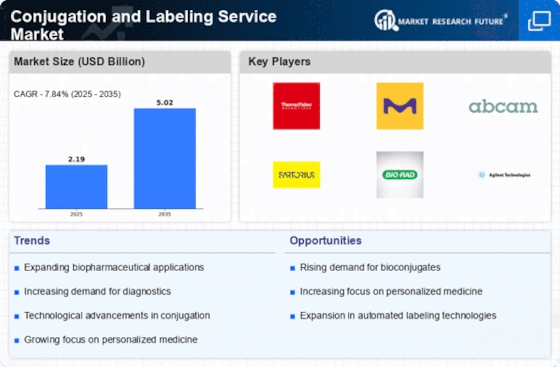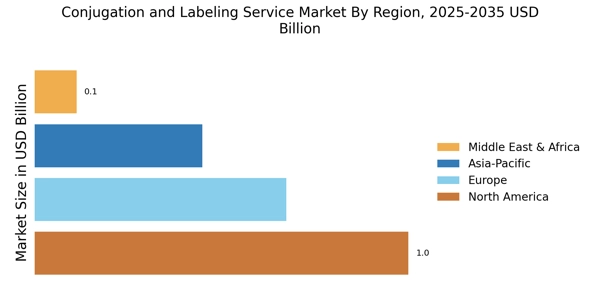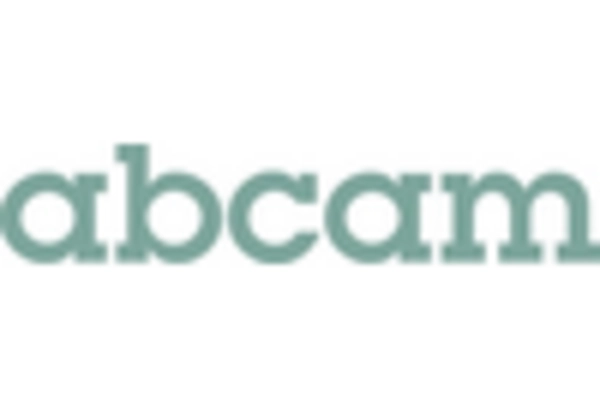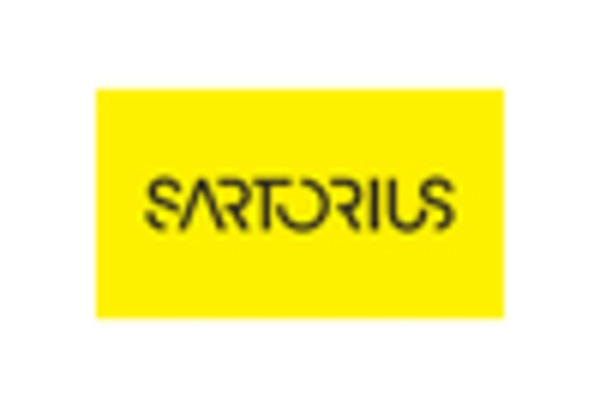Growing Biopharmaceutical Sector
The Conjugation and Labeling Service Market is benefiting from the rapid expansion of the biopharmaceutical sector. As the demand for biologics continues to rise, the need for effective conjugation and labeling services becomes increasingly critical. Biopharmaceuticals, including monoclonal antibodies and vaccines, often require precise conjugation techniques to enhance their therapeutic efficacy. The biopharmaceutical market is projected to surpass USD 500 billion by 2025, which suggests a substantial opportunity for conjugation service providers. This growth is likely to drive investments in conjugation technologies and services, as companies strive to meet the evolving needs of the biopharmaceutical industry. Consequently, the Conjugation and Labeling Service Market is expected to experience significant growth as it aligns with the burgeoning biopharmaceutical landscape.
Regulatory Support and Guidelines
Regulatory support and guidelines are playing an increasingly pivotal role in shaping the Conjugation and Labeling Service Market. As the industry matures, regulatory bodies are establishing clearer frameworks for the use of conjugated products in clinical applications. This regulatory clarity is essential for ensuring the safety and efficacy of conjugated therapeutics, which in turn fosters confidence among manufacturers and researchers. The establishment of guidelines for conjugation techniques and labeling processes is likely to streamline product development and approval timelines. Furthermore, as regulatory agencies continue to emphasize the importance of quality control in biopharmaceuticals, the demand for reliable conjugation services is expected to rise. This trend indicates a positive outlook for the Conjugation and Labeling Service Market, as compliance with regulatory standards becomes a priority for stakeholders.
Collaborative Research Initiatives
Collaborative research initiatives are emerging as a key driver in the Conjugation and Labeling Service Market. Partnerships between academic institutions, biotechnology firms, and pharmaceutical companies are fostering innovation and accelerating the development of new conjugation techniques. These collaborations often lead to shared resources and expertise, which can enhance the quality and efficiency of conjugation services. For instance, joint ventures focused on developing novel conjugation methods are likely to yield breakthroughs that can be commercialized. The increasing number of research grants and funding for collaborative projects is indicative of the growing recognition of the importance of conjugation services in drug development. This trend is expected to bolster the Conjugation and Labeling Service Market, as more entities engage in cooperative efforts to advance their research objectives.
Rising Demand for Personalized Medicine
The Conjugation and Labeling Service Market is significantly influenced by the rising demand for personalized medicine. As healthcare shifts towards more individualized treatment approaches, the need for tailored therapeutic agents is becoming paramount. Conjugation and labeling services play a crucial role in the development of targeted therapies, particularly in oncology and immunotherapy. The market for personalized medicine is expected to reach USD 2.5 trillion by 2026, indicating a robust growth trajectory. This surge is likely to drive demand for conjugation services, as researchers and pharmaceutical companies seek to create more effective and specific drug formulations. Consequently, the Conjugation and Labeling Service Market is poised to benefit from this trend, as it aligns with the broader movement towards precision medicine.
Technological Advancements in Conjugation Techniques
The Conjugation and Labeling Service Market is experiencing a notable transformation due to rapid technological advancements. Innovations in conjugation techniques, such as click chemistry and site-specific labeling, are enhancing the efficiency and specificity of conjugation processes. These advancements not only improve the quality of labeled products but also reduce the time required for development. As a result, companies are increasingly adopting these technologies to stay competitive. The market for conjugation services is projected to grow at a compound annual growth rate of approximately 10% over the next five years, driven by these technological improvements. Furthermore, the integration of automation and artificial intelligence in conjugation processes is likely to streamline operations, thereby attracting more players to the Conjugation and Labeling Service Market.

















